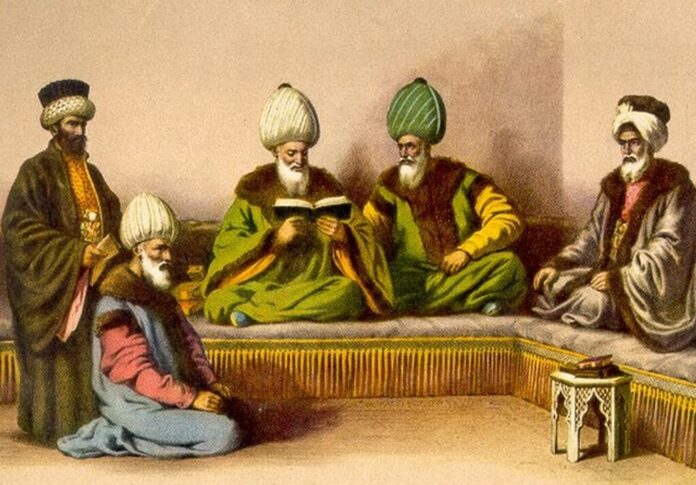ON TASAWWUF Ibn al-Jawzi (d. 597)
This hadith master and historian of the Hanbali school was a fierce enemy of innovators in his time. We have quoted extensively from his writings against anthropomorphists in the the first half of this book. His Talbis Iblis (Satan’s delusion) is often quoted by “Salafis” against tasawwuf, but he only wrote it against certain excesses which he saw in all groups of the Community, such as among scholars of all kinds and including Sufis.
Talbis Iblis is perhaps the most important single factor in keeping alive the notion of Ibn al-Jawzi’s hostility towards tasawwuf. In reality, this work was not written against tasawwuf or Sufis as such at all. It an indictment of all unorthodox doctrines and practices, regardless of their sources, and opposed any which he considered unwarranted innovations in the rule of Shari`a, wherever found in the Islamic community, especially in his time. It was written against specific innovated practices of many groups, including the philosophers (al-mutafalsifa), the theologians (al-mutakallimun), hadith scholars (`ulama’ al-hadith), jurists (al-fuqaha’), preachers (al-wu“az), philologists (al-nahawiyyun), poets (al-shu`ara’), and certain Sufis. It is in no way an indictment of the subjects they studied and taught, but was an indictment of specific introductions of innovation into their respective disciplines and fields.
Ibn al-Jawzi actually wrote many books of manaqib or “merits” about the early Sufis, such as Manaqib Rabi`a al-`Adawiyya, Manaqib Ma`ruf al-Karkhi, Manaqib Ibrahim ibn Adham, Manaqib Bishr al-Hafi, and others. His Sifat al-safwa (The manners of the elite) an abridgment of Abu Nu`aym’s Hilyat al-awliya’ (The adornment of the saints), and his Minhaj al qasidin wa mufid al-sadiqin (The road of the travellers to Allah and the instructor of the truthful) are considered pillars in the field of tasawwuf. He was prompted to write the latter by the success of Ghazali’s Ihya’ `ulum al-din, and indeed the Minhaj adopts much of the methodology and language of the Ihya’ in addition to treating the same subject-matter, self-purification and personal ethics.
The Minhaj was epitomized in one volume by Najm al-Din Abu al-`Abbas Ahmad ibn Qudama (d. 742). Here are some of its chapter titles and excerpts most illustrative of Imam Ghazali’s influence on Ibn al-Jawzi and of the latter’s adoption of Sufi terminology:
- Fasl `ilm ahwal al-qalb (Section on the science of the states of the heart)
- Fasl fi daqa’iq al-adab al-batina fi al-zakat (Section on the ethics of the hidden minutiae of zakat)
- Fasl fi al-adab al-batina wa al-ishara ila adab al-hajj (Section on the ethics of the secrets of the Pilgrimage)
- Kitab riyadat al-nafs wa tahdhib al-khuluq wa mu`alajat amrad al-qalb (Book of the training of the ego, the upbringing of the character, and the treating of the diseases of the heart)
- Fasl fi fa’idat shahawat al-nafs (Section on the benefit of the appetites of the ego)
- Bayan al-riya’ al-khafi al-ladhi huwa akhfa min dabib al-naml (Exposition of the hidden self-display which is more concealed than the treading of the ant)
- Fasl fi bayan ma yuhbitu al-`amal min al-riya’ wa ma la yuhbit (Section exposing the self-display which nullifies one’s deeds and the self-display which doesn’t)
- Fasl fi dawa’ al-riya’ wa tariqatu mu`alajat al-qalbi fih (Section on the remedy of self-display and the way to treat the heart from its ill)
- Kitab al-mahabba wa al-shawqi wa al-unsi wa al-rida (Book of love, passionate longing, familiarity, and good pleasure) Fasl fi bayan mi`na al-shawq ila allahi ta`ala (Section exposing the meaning of passionate longing for Allah)
- Bab fi al-muhasaba wa al-muraqaba (Chapter on taking account of oneself and vigilance)
- al-maqam al-awwal: al-musharata (The first station: commitment)
- al-maqam al-thani: al-muraqaba (The second station: vigilance)
- al-maqam al-thalith: al-muhasaba ba`da al-`amal (The third station: self-accounting after a deed)
- al-maqam al-rabi`: mu`aqabat al-nafs `ala taqsiriha (The fourth station: berating the ego for its shortcomings)
- al-maqam al-khamis: al-mujahada (The fifth station: struggling)
- al-maqam al-sadis: fi mu`atabat al-nafs wa tawbikhiha (The sixth station: castigating and chiding the ego)
Abu Bakr al-Siddiq said: “Whoever hates his ego for Allah’s sake, Allah will protect Him against what He hates.”
Anas said: I heard `Umar say as he was alone behind a wall: “Bakh, bakh! Bravo, well done, O my ego! By Allah, you had better fear Allah, O little son of Khattab, or he will punish you!”
Al-Bakhtari ibn Haritha said: “I saw one of the devoted worshippers sitting in front of a fire which he had kindled as he was castigating his ego, and he did not stop castigating his ego until he died.”
One of them said: “When the saints are mentioned, I say to myself: Fie on you and fie on you again.”
Know that your worst enemy is the ego that lies between your two flanks. It has been created a tyrant commanding to evil, always pushing you towards it, and you have been ordered to straighten it, cleanse it (tazkiyat), wean it from what it feeds on, and drag it in chains, subdued, to the worship of its Lord.1
1 Ibn Qudama, Mukhtasar minhaj al-qasidin li Ibn al-Jawzi, ed. M. Ahmad Hamdan and `Abd al-Qadir Arna’ut, 2nd. ed. (Damascus: maktab al-shabab al-muslim wa al-maktab al-islami, 1380/1961) p. 426.
Reproduced with permission from Shaykh M. Hisham Kabbani’sThe Repudiation of “Salafi” Innovations (Kazi, 1996) p. 340-344.
Blessings and Peace on the Prophet, his Family, and his Companions



